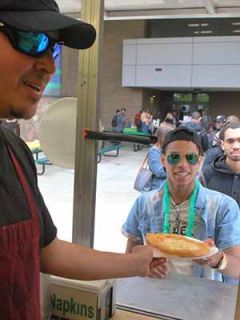Human Resources and Payroll
- Home
- Information for
- Faculty and Staff Resources
- Human Resources and Payroll
Human Resources Shared Services
CSCU Human Resources drives a shared services model in the delivery of high quality services across the 12 community colleges, Charter Oak, and the System Office. We create new strategies to drive operational improvements, promote a culture of continuous growth and development, and enable employees to access and leverage the HR Shared services through a Center of Excellence (COE) model.
Have a Question? Get in touch.
Linda A. Pestretto-Demers
Human Resources Generalist
203-596-8719 (p)
750 Chase Parkway
Waterbury, CT 06708
Susan B. Wright
Human Resources Data Specialist
203-575-8077 (p)
750 Chase Parkway
Waterbury, CT 06708
Payroll Employee Contact
Yolanda Crowder, Payroll Assistant
203-575-8267
Peggy Hayes, Assistant Payroll Coordinator
(860) 738-6412
Employee Resources
NVCC Org Chart
View the most recent organizational chartfor NVCC
Board of Regents Policies
Dual Employment
NVCC Policies:
Important HR Policies and Procedures:
- Employee Benefits
- Connecticut Community College Waivers
- Employment Information
- Wage & Salary Administration
Workplace Violence Prevention:
- Workplace Violence Prevention Training
(NVCC Fall 2013)
Retention of Records
Employee Benefits
- Benefits (State of CT) (medical, dental, miscellaneous, retirement)
- Employee Benefits
- Unclassified Tuition Waivers
Job Descriptions
Modified Work Schedule
Collective Bargaining Contracts
- Classified
- 2016-2021 Congress Contract (pdf)
- 2016-2021 AFT Contract (pdf)
- 2016-2021 AFT Part-Time Contract (pdf)
- 2016-2021 Congress-AFSCME Contract (pdf)
Employee Assistance Program
The Lexington Group EAP provides professional and confidential help for any personal problem such as:
- Marriage and Family Concerns
- Grief and Loss
- Emotional Stress
- Addictive Disorders
- Stress at Work or Home
- Elder Care
- Financial or Legal Resources
EAP Services include initial evaluation and assessment, treatment planning, short term counseling, referrals and coordination with your health insurance or community resources. The Lexington Group Employee Assistance Program is available 24/7 to help with any concern large or small.
Workers’ Compensation Injury Reporting
- Workers' Compensation Injury Reporting
- Workers' Compensation Medical Treatment New Initial Treatment Provider Network Guidelines
- DAS First Report of Injury WC 207 Form
Office of State Ethics
Form I-9
Access Paycheck statements online via Core CT:
Welcome to your Core CT access instructions. Please review all links below to set up your User ID and Password and to set up your Automated Password Reset feature.
Log into Core-CT URL as of June 22, 2015 at: https://corect.ct.gov/PEPRD/signon.html
(Please save as a favorite on your PC or create an icon on your desktop.)
Employee Time Sheet Entry- Core CT Self Service
- Employee Time Sheet Entry Quick Reference Guide
- Time Reporter Codes (TRC) NVCC
- Accrued Time Usage
- Employee Time Sheet Entry (FT Exception) Training Power Point
- Faculty Holiday Core CT Entry
- Staff Holiday Core CT Entry
- Part Time EA Payroll Guidelines
- Employee Time Sheet Entry (Part Time EA) Training Power Point
Approving Time for Supervisors
Payroll Schedules:
Direct Deposit Form:
Tax Forms
Important: Completed tax forms must be returned to Payroll, Room K707/K708
State Withholding:
Federal Withholding:
Additional form to be completed only if claiming exemption form federal withholding:
Guidelines:
Wage & Salary Administration Procedures
Payroll Contact Information
- Payroll Customer Service Center: For all payroll inquiries, employees should contact
This email address is being protected from spambots. You need JavaScript enabled to view it. (please make sure to email from your CSCU email address and include your CoreID in your requests). -
Region 2 Payroll Team– Naugatuck Valley, Northwestern, Asnuntuck, and Tunxis (overseen by Elizabeth Sohl, Payroll Manager)
· Assistant Payroll Coordinator: Peggy Hayes and Lisa Taylor
· Payroll Assistants: Rosario Rojas Reyes and Yolanda Crowder
Classified Performance Evaluation Forms:
- Administrative & Residual Service Rating Form (PER 127)
- Clerical Service Rating Form (PER 126)
- Maintenance Service Rating Form (PER 148)
- Performance Appraisal General Service Rating (PER 125)
Faculty Development Review Program:
Unclassified Performance Evaluation Forms:
AFSCME
AFT
Congress
Retirement Information
(State of CT)
Eligibility for Retiree Health Coverage
(Full time employees hired on or after July 1, 1997)
Important Information for Retired Employees Returning to Work Part Time
Tax Sheltered Annuities
Employees may voluntarily participate in a tax- sheltered annuity program (403b) and/or deferred compensation plan (457). There is no employer contribution to these programs.
Deferral of Vacation and Sick Leave Payouts from Final Paychecks to 403(b) or 457 Plans
State Employees Retirement System Revised Requirements for Limited Durable Power of Attorney (LDPOA)
COVID-19 Information
During this challenging time, the staff in HR/Payroll remain committed to ensuring continuity of services for all our employees at the College. We are all working remotely and are available by phone and email to provide guidance and answer whatever questions you may have.
Quick links to:
Payroll/Telework Guidance
Sick or Self-Quarantined Employees
What if I think I have or have been diagnosed with COVID-19
Payroll Guidance
Below is guidance from CSCU Human Resources on how we are to move forward with coding our time on time sheets and in Core CT.
Please also note that for the employees who do not have direct deposit, paper checks will be mailed directly from central payroll to the address on file.
Currently, we are working on a process for supervisors and managers to track and report electronically the scheduled hours of part time staff working remotely. We hope to have this process in place by the end of this week or the beginning of next week.
CSCU Payroll Guidance:
The following details basic teleworking principles as well as a guide on how to code COVID-19 related situations for payroll purposes. In addition, a FAQ is included to answer some frequently asked questions on payroll implications amidst the COVID-19 campus closures.
Telework:
All CSCU employees now teleworking with the exception of those employees designated as “Level 1” (formerly essential) and the following guidelines apply to those employees teleworking:
- Employees are expected to perform their roles to the best of their ability from home.
- Employees are expected to be available online via email or phone during their normally scheduled hours.
- For staff, supervisors should assign work to their employees that detail identifiable tasks that can be performed at home, with discernable, measurable outcomes.
- Employees are expected to actively monitor email and voicemails sent to email.
- Employees are expected to be available to return to their work site during normal
- working hours when requested by their manager.
- Employees can direct any questions on work assignments and requirements to their manager. This implies they should be in frequent contact with their supervisor for work assignments and other work-related needs.
Coding per OPM/DAS Guidance:
How should an employee code COVID 19 related leaves or telework in CORE-CT?
- AUTHORIZED PAID LEAVE PURSUANT TO OR CAMPUS CLOSURES: LOPD, used in conjunction with override reason code PDC19 (see screenshot below at the end of the memorandum for an example of the use of the override reason code). However, once an employee is authorized to telework, they should follow coding for that purpose.
- TELEWORK: REGTC, used in conjunction with override reason code TCC19
Full-time faculty should code their time to REG from March 16-20 and then begin to use REGTC and the PDC19 override code. - PERSONAL ILLNESS: Appropriate sick leave code and other accrual codes as necessary, used in conjunction with override reason code SCV19
- CAREGIVER OF A FAMILY MEMBER WHO IS SICK WITH COVID-19 (when not teleworking): Appropriate family sick leave code and other accrual codes as necessary, used in conjunction with override reason code SFC19
- SCHOOL, DAYCARE OR TRANSPORTATION CLOSURE (when not teleworking): Appropriate leave code, used in conjunction with override reason code BCC19
General Payroll FAQs
If an employee, EA, UA, or a student is scheduled to work but is teleworking, should they be paid?
Yes, and it should be coded as REGTC with the appropriate override reason code (herein as PDC19). The reporting requirements for PTLs, ECLs and NCLs are covered by the terms and conditions set forth in the Notice of Appointment which include "the obligation to meet each scheduled class and to complete all assigned responsibilities, including rescheduled classes and makeup of work missed, where appropriate..." PTLs, ECLs and NCLs shall not be docked pay for failing to meet a class due to the College closing.
An employee had scheduled a vacation prior to the recent campus closures, should they use their vacation time or the related COVID-19 payroll code?
The employee shall code the time off as VAC. However for P-5 employees, when a shift (or portion thereof) is granted by the act of the Governor or their designee, an employee scheduled to be charged vacation or personal leave shall not be charged. However, if the employee had an entire workweek off for vacation/personal leave, then they should use VAC for the entire week.
Our campus was forced to shut down to suspected COVID-19 exposure, how should the employees time be coded?
Employees should be paid using the LOPD code for the length of the closure prior to teleworking. Employees should follow the telework protocol thereafter.
It is a requirement that all employees, as able, should move to telework, how should we code that time?
This should be treated as if they are working in a physical office location and should be coded as REG 3/16-3/20 and then REGTC after that.
What if, at the present moment, we are unable to get the employee fully set up for telework, how should we code their time?
This again should be treated as if they were working and coded as REGTC with the appropriate override reason code.
If a Level 1 employee needs to work OT during this period, are they eligible?
Yes.
If an employee usually receives a paper paycheck, how will they now obtain their check?
The Office of the State Comptroller will be mailing employee paychecks to the employee’s most current address on file until further notice.
Sick or self-quarantined employees
- Employees who become ill while teleworking and cannot perform their duties must report the illness to their manager and code time sheets accordingly.
- Employees diagnosed with COVID-19 by a medical professional must notify Linda A. Pestretto-Demers in Human Resources at
This email address is being protected from spambots. You need JavaScript enabled to view it. , 203-596-8719. - Employees directed to self-quarantine by a medical professional must notify Linda A. Pestretto-Demers in Human Resources at
This email address is being protected from spambots. You need JavaScript enabled to view it. , 203-596-8719.
What if I think I have COVID-19?
- If you think you have been exposed to COVID-19 and develop symptoms, such as fever, cough or difficulty breathing, call your healthcare provider for medical advice.
- Stay home except to get medical care.
- Separate yourself from other people and animals in your home.
- Call ahead before visiting your doctor.
- Cover your coughs and sneezes.
- Clean your hands often.
- Avoid sharing personal household items.
- Clean all “high-touch” surfaces every day.
- Monitor your symptoms.
Annual Public Notice of Nondiscrimination
Continuing Notice of Nondiscrimination: Naugatuck Valley Community College does not discriminate on the basis of race, color, religious creed, age, sex, national origin, marital status, ancestry, disability, including but not limited to present or past history of mental disability, learning disability or physical disability, sexual orientation, gender identity or expression or genetic information in treatment or employment at the College, in admission or access to the College, or in any other aspect of its programs and activities. In addition, the College does not discriminate in employment on the additional basis of veteran status or criminal record. The College is required by Title VI of the Civil Rights Act of 1964 (Title VI), Section 504 of the Rehabilitation Act of 1973 (Section 504), Title II of the Americans with Disabilities Act of 1990 (Title II), Title IX of the Education Amendments of 1972 (Title IX), the Age Discrimination Act of 1975 (Age Act), and their respective implementing regulations at 28 C.F.R. Part 35 and 34 C.F.R. Parts 100, 104, 106 and 110, not to discriminate on the basis of race, color, or national origin (Title VI); disability (Section 504/Title II); sex (Title IX); or age (Age Act). Inquiries concerning the application of each of the aforementioned statutes and their implementing regulations to the College may be referred to the applicable College Coordinators: Kimberly Carolina, CSCU Manager of Equal Employment Opportunity,







